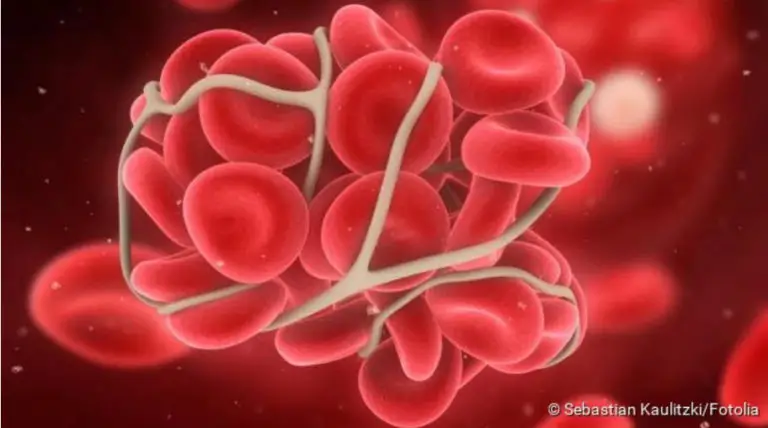Psychosis: description, symptoms, causes, therapy
Psychosis
Psychosis is an umbrella term for severe mental disorders in which the people affected lose touch with reality (Source). The patients perceive themselves and their environment as changed (Source). Typical signs of psychosis are delusions and hallucinations (Source). In addition, disturbances in thinking and motor skills can develop (Source). Here you can find out everything important about the clinical picture of psychosis.

Brief overview
- What is psychosis? It is a collective term for various psychological disorders. Patients affected with this condition lose touch with reality. Their personality changes without them realizing it themselves. The first signs appear at an early age, often during puberty.
- Symptoms: In the beginning, concentration disorders, thinking disorders, lack of drive and inner emptiness, performance slump, sleep disorders, decreasing joy of life, depressions, fears. Later, for example, irrational thoughts (obsessive thoughts), sudden, strong interest in religion, mysticism or magic, also distrust, hostility/aggression towards others, strong ego relation, hallucinations, ego disorders, emotional and/or motoric changes.
- Causes: Organically induced psychosis is caused by altered brain functions as a result of basic physical illnesses (dementia, epilepsy, multiple sclerosis), medication (e.g. for Parkinson’s disease) or drugs (LSD, cannabis). Non-organic psychosis develops as a result of basic mental disorders (schizophrenia, depression, bipolar disorder) or birth stress (postpartum psychosis, puerperal psychosis).
- Diagnostics: Doctor-patient interview to take the patient’s medical history (anamnesis), physical examination, psychological diagnosis using questionnaires based on international classification catalogues
- Treatment: Medication with antipsychotic drugs, in addition possibly mood stabilizers such as lithium, antidepressants (Source). Supplementary psychotherapeutic treatment (psychoeducation, cognitive behavioural therapy) (Source).
- Prognosis: With early diagnosis and appropriate, consistent treatment, a favourable course with good chances of recovery (Source).
What Is Psychosis?
The collective term psychosis covers various psychological disorders that have one thing in common: In all cases, the patients lose touch with themselves and their environment. The personality of those affected changes without them realising it themselves. On the contrary – psychotics believe that it is not they themselves but their environment that changes.
A psychosis can manifest itself in many ways, the symptoms can vary from patient to patient. That is why the definition of psychosis has changed again and again over time. Today we know that psychoses can be part of various diseases – from dementia to mental disorders such as schizophrenia. Drugs, certain medications and specific life situations such as the phase after birth can also trigger psychosis.
About one to two per cent of the population develops a psychosis once in their life. Women are affected just as frequently as men. The symptoms often appear at a young age, often for the first time between the ages of 15 and 25.
Organically and non-organically caused psychosis
Usually, many different factors play together in the development of psychosis. However, a basic distinction is made between organically caused and non-organically caused psychosis (formerly: endogenous and exogenous psychosis):
Organically conditioned psychosis can occur, for example, in the case of dementia or brain damage as a result of drug abuse and in connection with certain drugs. Non-organic psychosis can occur in the context of mental illness such as schizophrenia or bipolar disorder.
Symptoms Of Psychosis
The symptoms of psychosis are individually very different and depend on the respective triggers.
Psychosis: First signs
Even years before a psychosis manifests itself, the first signs can point to the beginning of the disease. These include:
- Difficulty to concentrate on a specific activity: Psychosis sufferers are often nervous, restless and have difficulty concentrating. They can be quickly distracted and often cannot pay attention to several things at once.
- Thinking disorders: So-called thought interference and blockages can also be early signs of incipient psychosis. The affected persons then repeatedly experience incoherent thoughts that can be pushed between other thoughts and are difficult to shake off. Some also suffer from a sudden flood of thoughts that can hardly be channelled.
- Lack of drive and inner emptiness: People at risk of psychosis are often unmotivated, indifferent and feel empty inside. Many withdraw from family, friends and acquaintances and avoid social contacts.
- Slump in performance: The ability to perform at school or at work can decrease significantly. However, this symptom is not typical of an emerging psychosis, but can also indicate the onset of depression.
- Sleep disorders
- Declining vitality
- Depressions
- Anxieties
A psychosis often develops in the teenage years. However, the symptoms are often misinterpreted as typical puberty problems. In contrast, a psychosis cannot “grow out”. On the contrary – the symptoms become more pronounced over time.
If you have the slightest suspicion of a psychotic disorder in your child, you should consult a doctor (family doctor or psychiatrist). You should also take vague indications particularly seriously if other family members suffer from a psychosis.
Psychosis: symptoms in the further course
Over time, clearer symptoms develop, which can indicate an impending psychosis. These include:
- irrational thoughts (for example, obsessive thoughts)
- sudden, strong interest in religion, magic or mysticism
- Distrust, hostility and aggression towards others
- strong ego-reference, actions of others (also strangers) are unreasonably strongly related to the own person.
- Hallucinations
- Thinking disorders
- Ego disturbances
- emotional changes
Psychosis symptoms: Hallucinations
Many psychosis patients suffer from hallucinations. In principle, all senses can be affected, but acoustic hallucinations are the most common. Typically, the affected persons hear voices that comment on their behaviour or give them orders. These voices are usually perceived as threatening. Other patients see objects, people, colours or faces (optical hallucinations) that are not present in reality. Sometimes olfactory or sensory hallucinations occur in which the patients perceive non-existent smells or touches.
Psychosis symptoms: Disorders In The Thinking Process
Disorders in the thinking process are another typical sign of psychosis. A distinction is made between thinking disorders of a substantive and formal nature. Content-related mental disorders include delusions such as persecution and relationship delusions, megalomania and delusions of guilt:
- Patients with paranoia, for example, feel persecuted by aliens or believe that other people are trying to harm them.
- Patients suffering from relationship delusion refer general events to themselves or interpret certain objects or persons as a threat. A typical sign is, for example, when those affected believe that speakers on television or radio are sending them secret messages.
- Delusions of grandeur are present when, for example, someone believes he or she is a famous person or a misunderstood genius.
- In the case of guilt delusion, those affected are convinced that they are responsible for the suffering of others, although objectively there is no reason for this.
Content-related thinking disorders can also manifest themselves in the form of fixed ideas – experts speak of superior ideas. A characteristic feature of this is that the sufferers’ thoughts almost always revolve around one and the same topic. Obsessive-compulsive thoughts (such as the conviction that they must perform a certain action again and again) are also part of the content of thought disorders.
In the case of formal thinking disorders, on the other hand, the flow of thoughts is disturbed. This can manifest itself in:
- unclear, confused, incomprehensible speech
- frequent, incomprehensible mental leaps
- a sudden break from thoughts (thought break)
- slower thinking
- the invention of new terms and word combinations (neologisms)
- omitting the actual subject
- Brooding
- the permanent repetition of always the same sentences and thoughts
- distorted thinking, incoherent sentences (incoherent thinking)
- the inability to separate the important from the unimportant (awkward thinking)
- a limited vocabulary as well as restricted thinking restricted to a few topics (lack of ideas)
- the feeling that certain thoughts impose themselves as if of their own accord (Thought Impetus)
Psychosis symptoms: Ego disorders
In an ego disorder, the border between the own ego and the outside world becomes blurred. Affected people are convinced that their thoughts can be heard by others (thought withdrawal), that others withdraw their thoughts from them (thought withdrawal) or that their thoughts and actions are controlled and influenced by other people. Some feel that their environment is unreal (derealization) or is alien to themselves. These patients do not experience their own arm as part of their body (depersonalization).
Psychosis symptoms: emotional changes
Psychotics experience emotions differently than healthy people. Often their emotions are less intense so that they seem almost emotionless. Some patients are very irritable during an acute psychosis. Sometimes affected people react inappropriately, for example by starting to laugh in a sad situation.
Other psychosis symptoms
Psychosis can also lead to motor changes. Those affected then suffer from severe restlessness and an extreme urge to move or, in contrast, can freeze completely and remain motionless.
Many psychosis sufferers withdraw completely. They neglect their appearance and no longer devote themselves to their previous interests. They break off their social contacts and can no longer cope with everyday life on their own, let alone pursue a profession. Some never leave the house again.
Rarely do they commit violent acts against themselves or against others.
Causes And Risk Factors
The exact causes of psychosis are not known. However, there seems to be a close connection with malfunctions in the brain. Thus, psychoses can occur due to brain injuries, changes in the nervous system or metabolic disorders. Medication and drugs can also cause the disease. Furthermore, psychoses can occur with certain mental disorders. Experts speak of a multifactorial causative process in which biological and psychosocial factors interact.
Physical diseases
Certain underlying physical illnesses can alter brain functions and trigger psychosis. These include:
- Dementia: In dementia patients, structures in the brain change. These changes can lead to psychotic disorders. Alzheimer’s dementia in particular is often accompanied by hallucinations and delusional symptoms.
- Epilepsy: In an epileptic seizure, the nerve cells in the brain discharge uncontrollably. Sometimes psychoses occur before and during the seizure. Most often, however, psychotic symptoms appear immediately after an epileptic seizure.
- Multiple sclerosis: In this disease the protective sheath of nerve fibres (myelin layer) is successively destroyed, which can impair brain function. Psychotic symptoms can be the result.
Medication
Sometimes drugs can also cause temporary psychotic symptoms such as severe confusion or hallucinations. The most common drug-induced psychosis triggers include Parkinson’s drugs.
In Parkinson’s disease, certain nerve cells in the brain progressively die, which leads to a lack of dopamine. This leads to a lack of dopamine, which triggers typical Parkinson’s symptoms such as slowed movements, muscle stiffness (rigor) and tremor. Parkinson’s drugs increase the dopamine level in the blood of patients. However, if the dopamine level is then too high, psychological problems such as psychosis can develop. Very old Parkinson’s patients are particularly often affected by this. Stress and dehydration can increase symptoms.
Very rarely, psychosis is based on cortisone preparations, which – in high doses – can have a euphoric effect. However, the probability of this causing a psychosis is very low. If at all, the symptoms then only occur temporarily.
Drugs
LSD can trigger a so-called drug psychosis with hallucinations and delusions (LSD psychosis or amphetamine psychosis). Depending on how much and what kind of drug was used, the symptoms disappear after a few hours or remain for a few days.
It is noticeable that about half of all psychosis patients use substances such as alcohol, cocaine or cannabis. However, it is not always clear whether the symptoms were present before, or whether they were caused by drug abuse. However, experts stress that drugs can significantly worsen the course of a psychosis. Recent research shows that cannabis users with a genetic predisposition to psychosis have a significantly higher risk of developing this psychosis (cannabis psychosis).
Mental disorders
Psychoses often occur in severe mental illness. Most often schizophrenia patients suffer from psychoses. However, people with bipolar disorders or depression can also be associated with psychotic symptoms. For example, schizoaffective psychosis can occur in a mixed form of schizophrenia and affective disorders such as depression or bipolar disorder. Paranoid psychosis can accompany paranoid schizophrenia (this is the most common form of schizophrenia).
The exact connections have not been fully researched. However, experts assume that mental illnesses occur when the messenger metabolism in the brain does not function properly. The messenger substances dopamine, serotonin and glutamate are probably involved.
A genetic predisposition (disposition) probably also plays a role. In some families, psychoses occur more frequently: Certain genes seem to increase mental vulnerability and thus the risk of developing psychosis.
In most cases, however, the illness only breaks out when stressful external factors are added. Stress is one of the most important risk factors. Stressful experiences such as a separation or difficult phases of life such as puberty can promote the onset of psychosis.
However, whether such experiences actually lead to psychosis varies greatly from person to person. Some people only develop a psychosis after massive psychological trauma, while others develop it even after comparatively moderate stress.
Postpartum psychosis
Postpartum psychosis occurs in the first weeks after birth. Researchers suspect that the extreme sleep deprivation of the new mother favours the onset of the disease.
Postpartum psychosis requires immediate medical treatment because the mother’s loss of reality can endanger both herself and the child.
Diagnosis And Examinations For Psychosis
If you suspect a psychosis, you should urgently consult a doctor. The loss of contact with reality can put yourself or others at risk, and the first point of contact for suspected psychosis is your family doctor. If necessary, he will refer you to a psychiatrist in private practice or to a psychiatric clinic.
In order to get an idea of the symptoms, the doctor will ask you the following questions during the initial consultation (anamnesis):
- Do you hear voices or see things that others cannot hear or see?
- Do you have the feeling that you are being followed?
- Do you have much contact with family members and/or friends?
- Have you been unusually irritable lately?
- Do you often feel depressed or agitated?
After the initial consultation, a physical examination will follow. It may provide evidence of an organic cause of the psychosis. Using blood and urine samples, the doctor can determine whether drug abuse, inflammation or metabolic disorders may be behind the symptoms. Neurological tests can be used to diagnose diseases of the nervous system such as multiple sclerosis and epilepsy.
If the doctor cannot determine an organic cause, you will be examined for possible mental illnesses such as schizophrenia, bipolar disorder and depression. This is because psychoses often develop as a result of these underlying diseases. For diagnosis, psychologists and psychiatrists use clinical questionnaires based on the classification systems of mental disorders.
Treatment Of Psychosis
How the psychosis treatment looks like in individual cases depends on the causes. If possible, the trigger (basic illness such as depression, bipolar disorder, drug addiction etc.) is treated. In addition, psychosis symptoms can be alleviated with medication.
Medication
Psychoses are treated with so-called antipsychotics (formerly: neuroleptics) such as Haloperidol. These drugs work very well against hallucinations and delusions but have strong side effects. The most common ones include:
- Fatigue
- Loss of drive
- Weight gain
- Movement disorders
- Muscle twitching
To avoid these side effects, so-called atypical antipsychotics are now often prescribed. They are usually better tolerated, but can also lead to fatigue and weight gain in individual cases.
Despite the possible side effects, it is very important that the patient consistently takes the prescribed antipsychotics – as long as prescribed by the doctor. This prevents relapses. Some patients also have to be treated with medication throughout their lives.
Patients whose psychosis is based on a bipolar disorder are additionally treated with mood stabilizers such as lithium. If the psychosis is accompanied by depression, antidepressants help.
Psychotherapy
In addition to drug treatment, psychotherapy can further stabilize the patients. Two methods are particularly suitable for psychotherapy: Psychoeducation and cognitive behavioural therapy.
Psychoeducation
The diagnosis “psychosis” can make patients and their relatives feel very insecure and frightened. Targeted, comprehensive education about the disease (psychoeducation) helps those affected to cope with their fears and reduce prejudices, misconceptions and feelings of guilt. In addition, patients and relatives are trained to recognise the first signs of a psychosis in order to become aware of possible relapses at an early stage.
Cognitive behavioural therapy
Patients learn special techniques to control delusions and reduce depressive symptoms, anxiety and stress. After all, even medication cannot always protect against a new attack.
In addition, patients train their social skills to reduce stress, strengthen social contacts and deal with stressful situations in a more relaxed manner.
Prognosis Of Psychosis
For a long time, psychoses were considered difficult to treat or even incurable. However, this has now changed thanks to improved therapeutic options. Today, a psychosis usually proceeds favourably in most cases. If the disease is diagnosed and treated early, the chances of recovery are good. Everything that gives stability to the life of the affected person in addition to drug and psychotherapeutic treatment improves the prognosis. This includes stable social ties and a professional environment that does not overtax patients with psychosis.




